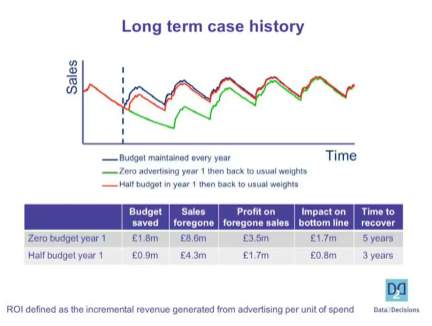In the ceaseless heartbeat of the urban colossus known as Metropolis, a spirited duel had long been enacted. Two techno-titans, SparkTech and Apex Innovations, relentlessly sought to outdo each other, their rivalry echoing through the city's labyrinthe of glass and steel canyons.

In the closing act of 2023, a cruel economic tempest descended upon the unsuspecting metropolis. Business empires, like galleons in a hurricane, rocked and swayed in the merciless gale. Our stalwarts, SparkTech and Apex Innovations, found themselves battling the same monstrous waves.
SparkTech's orchestrator, the steadfast Simon, saw in the gathering clouds an opportunity to shield his precious company. Viewing marketing as little more than a monetary drain, he mercilessly axed the marketing budget. He was convinced that in the harsh winter of economic despair, survival was paramount, and this was the necessary sacrificial lamb.
In the heart of Apex Innovations, however, their indomitable leader, Angela, surveyed the same storm with different eyes. She viewed marketing not as a burdensome expense but as the lighthouse guiding their ship through the tempest. She resolved to retain every penny of their marketing investment. To weather the storm, she turned her gaze towards operational expenses and supplier negotiations, shearing where she could, yet preserving the beacon that would guide their customers to them.

The ensuing months unfurled the impact of their divergent strategies. Bereft of its marketing lifeblood, SparkTech’s once-illustrious presence began to fade like a waning moon in the industry. Forgotten by customers and shadowed by competitors, it resorted to discounting its inventions, further gnawing at the shrinking profitability.
Meanwhile, Apex Innovations emerged as a phoenix, its marketing flames burning brighter in the gloomy downturn. Communicating, reassuring, and standing shoulder-to-shoulder with their customers, they filled the vacuum left by SparkTech's retreat. The market, like iron to a magnet, was inevitably drawn to Apex, perceiving them as the beacon in the storm.
As the year took its final bow, SparkTech was left a hollow shell. Its sales were anaemic, cash reserves depleted, and customer loyalty a fading echo. Simon, faced with the desolate landscape of his empire, realised the cataclysmic error of his choice. The once-glowing star of SparkTech had dimmed into obscurity, outshone by its audacious rival.
In contrast, Apex Innovations, under Angela's sagacious leadership, emerged from the storm resplendent. Her audacious decision to preserve their marketing budget, to keep their lighthouse burning, had resulted in a stronger, more resonant voice. By skillfully trimming the real costs and safeguarding their marketing fortress, Apex successfully sailed through the economic maelstrom.
As the tempest's fury abated and the first blush of a new dawn kissed the skyline, Apex Innovations stood poised, reborn in resilience, and robust beyond yesteryears. Its bright countenance, unmarred by the passing storm, shone brilliantly, a beacon of triumph in the rosy dawn's embrace.
Long story short...
In the tale of SparkTech and Apex Innovations, we uncover a tableau of strategic foresight and missteps. It is a parable of short-sighted choices and the triumph of far-seeing wisdom. Two enterprises, two helmsmen, two decisions, and a twain of fates as different as night and day.
Right now we find ourselves in the summer lull, and before us we hear rumours of recession. I have noticed that many of you are already facing headwinds, and it can be easy to start looking at defensive strategies, to batten down the hatches and weather the storm. Survival strategies become ever more pressing.
I understand this survival reflex. It’s deeply baked into every one of us. It’s an instinct that needs to be actively observed and controlled if we are to be successful in our endeavours. But nobody ever survived by hiding in a cave. It’s those that went out to hunt that seized the rewards. Thats's why I’m a firm believer that offence is the best defence. The research I will share with you today bears the same message.
Consider the compelling evidence compiled from research conducted by Millward Brown, Data2Decisions, and Butterfield.
Each one of these studies was on a mission to determine the consequences of reducing advertising and marketing spend during a crisis. Interestingly, they all came to the same conclusion.
Without exception, each study found that those brands which decided to slash their spending during a downturn, hoping to save some quick bucks, ended up paying a much steeper price in the long run. These brands took considerably longer to bounce back to their previous performance levels.
Data2Decisions found that businesses who cut their marketing budget by 100% in a downturn took FIVE YEARS for their revenue to return to the same level they were at before the recession. That’s an average, not a maximum.

Businesses who cut their marketing budget by 50% still took THREE YEARS to recover!
So why does this happen?
It’s all down to “Share of Voice”. How much of the message and narrative does your business command, relative to the competition? Over time, Share of Voice has a direct correlation with Share of Market. Those who are omnipresent with their audience will win their trust and eventually their business.
Of the brands surveyed, those who chose Defence and reduced their marketing budget inevitably experienced reduced Share of Voice, which led to reduced awareness & trust and consequently reduced interest.
The problem then compounds. With reduced interest, teams are forced to use discount pricing in order to maintain volumes. But discount pricing erodes profitability, making it even harder to reinvest in growth. It’s a downward spiral that’s almost impossible to get out of.
And the most insidious part?
The impact of these cuts is deceptively time-lagged. Researchers found it takes a full year on average before the damage is visible on the bottom line, by which time it’s too late. This is because the previous marketing exposure continues to benefit the business for a while, providing a false illusion that costs were cut and no negative effects were felt. Nevertheless, the damage caused by the loss of Share of Voice is simmering under the surface, and gradually becomes prevalent once the heady days of marketing have worn off, and the impact of no voice starts to hit sales.
Think about what this meant for the brands who chose Offence instead, and fought for their survival by staying present with their audience. Communicating, reassuring, and standing shoulder-to-shoulder with their customers, they filled the vacuum left by their competitors' retreat. Their increased Share of Voice meant they weren’t forced to apply discount pricing, and their profit margins were maintained. That gave them the ability to dominate and grow market share for an entire year, with no additional investment, before their competitors realised the devastating mistake they had made.
So ask yourself:
As the storm clouds begin to gather once more, do you want to repeat the mistakes of the past and be a Spark Tech, or do you want to seize this as an opportunity, a gift handed to you by your fearful competitors, and emerge triumphant like Apex Innovations?
For those of you who choose to be like Apex Innovations, look out for my next email where I’ll detail the four stages of a downturn and how you can protect your survival whilst positioning yourself to seize the long-term opportunities.
Reach out
If you are particularly concerned about your prospects should a recession befall us, then skip the queue and reach out to me today. I'll hear your plight and help you steer your ship into calmer waters.


